CTP Episode of the Day - 10.18.06 - The Sixth Extinction II: Amor Fati
Today's Cherished Episode: The Sixth Extinction II: Amor Fati (7x04)
Original Air Date: November 14, 1999
Written By: David Duchovny & Chris Carter
Directed By: Michael Watkins
Scully continues to try to find a cure for Mulder's illness as the Cigarette-Smoking Man ups the emotional ante with surprising revelations, dire promises, and a genetic transplant procedure that will make the promise of world domination a reality.
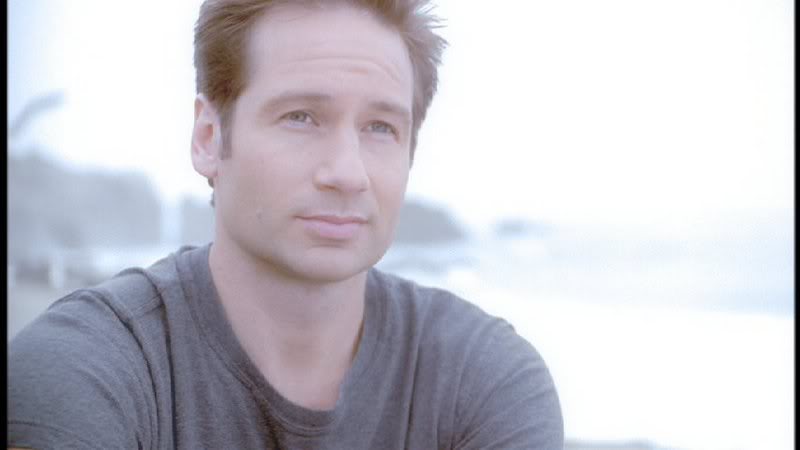
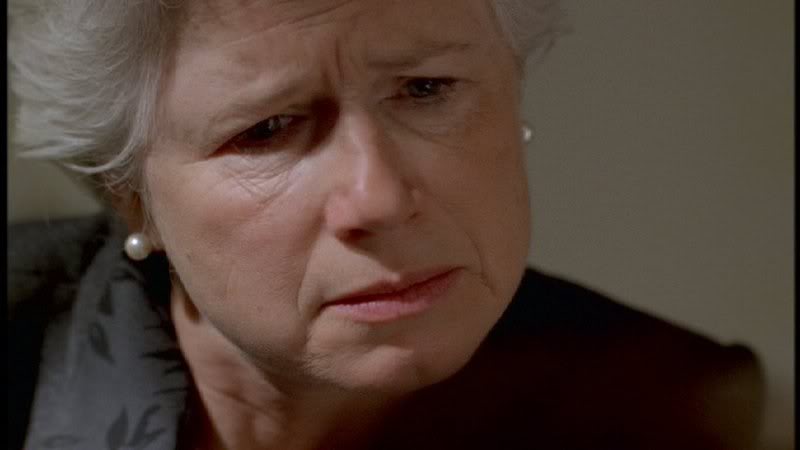
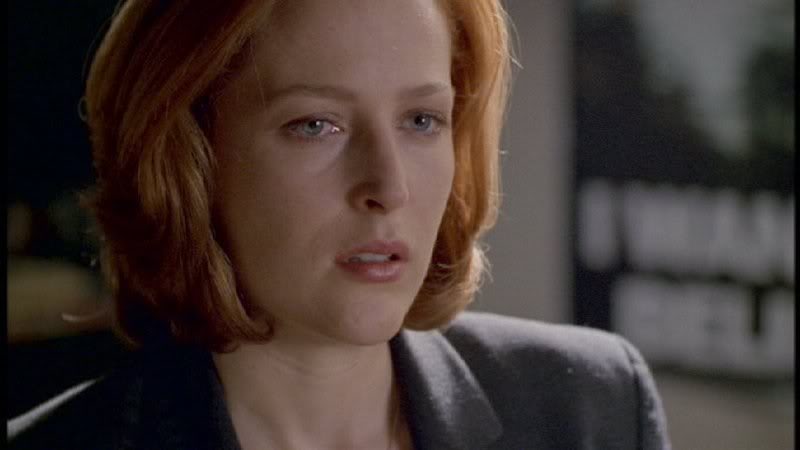
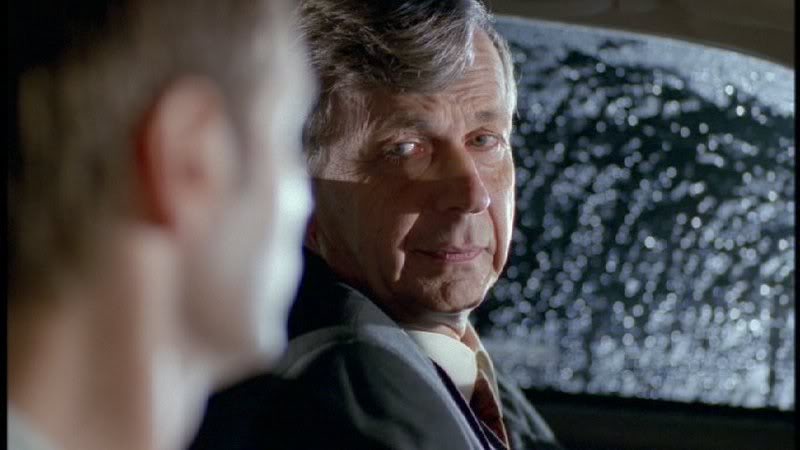
"Scully, I was like you once. I didn't know who to trust. Then I chose another path, another life, another fate, where I found my sister. The end of my world was unrecognizable and upside down. There was one thing that remained the same. You ... were my friend, and you told me the truth. Even when the world was falling apart, you were my constant, my touchstone."
"And you are mine.
Some "The Sixth Extinction II: Amor Fati" Tidbits & Musings:
-- The tagline for this episode was changed to the subtitle: "Amor Fati."
-- "Amor Fati" means "Love of Fate." It can be a religious term, having to do with our lives being divinely willed (thus we are supposed to love our lives). A relatively famous phrase, it was written about by Nietzsche ("Amor Fati: let that be my love henceforth").
-- David Duchovny had always had a warm spot in his heart for Nikos Kazantzakis's novel The Last Temptation of Christ. That it could be translated into a compelling X-File that he would co-write with Chris Carter was an exciting possibility.
-- "For David, there was the strong desire to play something different as Mulder," explained Frank Spotnitz. "He saw a lot of parallels between The X-Files and The Last Temptation of Christ that he felt he could bring out."
-- "'Amor Fati' was something very personal to these characters but, in particular, to Mulder," reflected Chris Carter. "The big question was, had he made the right choice in deciding to pursue the aliens all these years through the X-Files? It was a very emotional episode. We had actually tried to play to David's desire to have his character explore something, a different dimension or a different depth, a different emotional range of his character. I think it had some very personal issues in it for David."
-- The story conferences were typical in that everybody fought hard for what they felt was important to the story. Particularly vocal in his defense of the storyline was Duchovny. "We all knew it was an important script and that a lot of the new mythology and the direction of the show for the rest of the season would hinge on it," said Spotnitz. "Everything about this story arc was a risk and 'Amor Fati' was quite possibly the riskiest element of the three episodes. As the co-writer, David had a particular stake in it being as good as it could possibly be."
-- "I was really attached to that idea," Duchovny said. "The Last Temptation of Christ is about how we're all Christ, about how every single person on this planet has to make this heartbreaking choice between a life in the world and a life of the family. That's what makes Christ so heartbreaking in that book and movie: his struggle is not only God-like, but also profoundly human. People ask, 'When is Mulder going to get a personal life?' Well, this is the equation. This is what it's all about. Mulder is a guy who's been given the same problem. You either have a life or you sacrifice it all and you become this guy who's running around chasing aliens and has no life. I wasn't saying Mulder is Christ; I wasn't inflating Mulder. What I was doing was using the very human model of Christ to make Mulder an everyman."
-- Despite eight years of training in literary analysis, Duchovny does not analyze the story during the writing process. "I do that much more as an actor," he said. "I think one of the problems with studying great literature at a young age is that it intimidates you and you just go, 'What's the use?' When you're 17 and reading Shakespeare and you have thoughts of being a writer yourself, it's like having one week of boxing lessons and going in against Mike Tyson. You say to yourself, 'I'll never be a boxer.' It's not necessarily true. So there was some of that: "Well, if it's not Shakespeare, why should I even try?'"
-- The tight schedule would add additional challenges to the "Amor Fati" writing process. "Chris had only just begun writing 'The Sixth Extinction,'" said Spotnitz. "David had written half the script for 'Amor Fati,' but there were blanks that Chris was supposed to come in and finish but couldn't because he was still writing 'The Sixth Extinction.'"
-- But enough of the "Amor Fati" script had been written to know that it was going to contain a who's who of X-Files episodes past. Brought back for elements of Mulder's alternate future were Jerry Hardin as Deep Throat and Megan Leitch as Samantha Mulder. Also making appearances were Rebecca Toolan as Mrs. Mulder and Floyd Red Crow Westerman as the inscrutable Albert Hosteen. "It was like one big flashback," said casting director Rick Millikan.
-- Casting the little boy who appeared to Mulder on the beach was perhaps the toughest part of the episode for Millikan. Originally, the son of a neighbor of producer Paul Rabwin came in, read for the part, and seemed perfect. But with the script and shooting schedule under time pressure, it was finally determined that all of the child's shots would have to be done in one day. This caused a problem in that child labor laws limit the number of hours a minor can work. Rabwin recalled that the problem was finally solved by going out and hiring twins.
-- This was Rebecca Toolan's first appearance as Teena Mulder since Season 4's "Demons."
-- There was much debate about when Mulder's "dream" began in this episode. IMBO, it began when the room changed from light to dark, back to light again, and CSM began his dissertation.
-- CSM's first line is the first line of Shakespeare's Sonnet 29, which begins: "When, in disgrace with fortune and men's eyes, I all alone beweep my outcast state And trouble deaf heaven with my bootless cries, And look upon myself and curse my fate, Wishing me like to one more rich in hope, Featur'd like him, like him with friends possess'd, Desiring this man's art and that man's scope, With what I most enjoy contented least ..."
-- I find it tremendously hard to believe that anyone could get a shot in their temple with a needle of the size that CSM used.
-- One of my favorite lines from the teaser that was cut from the final script (Mulder to CSM): "You're as insane as I seem to be."
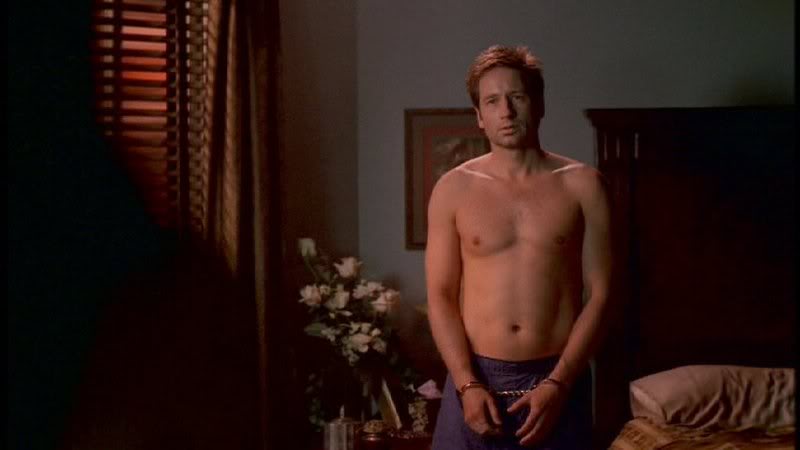
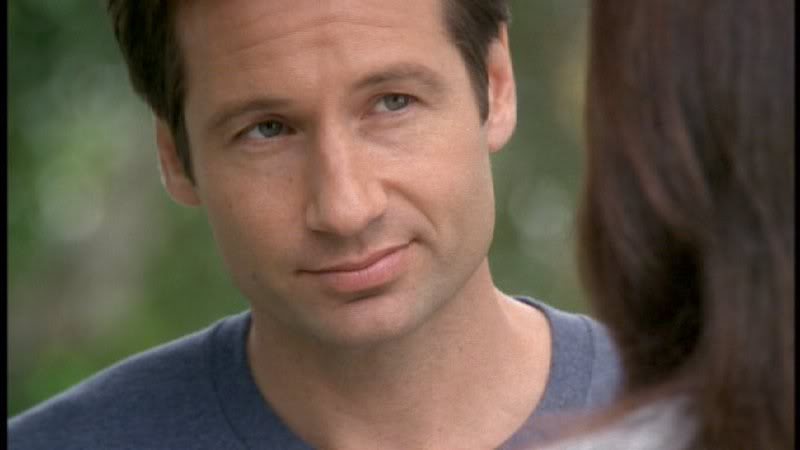
-- Oopsie! The first shot of Scully showed her sleeping, head down on her desk, glasses discarded and resting on a book ... a book she wouldn't receive from an anonymous source until later in the episode.
-- The Last Temptation of Christ (TLTOC) was a novel by Greek writer Nikos Kazantzakis (who also wrote "Zorba, the Greek"). TLTOC presents a four-fold division of Jesus' adult life. After a period of morbid doubt and dread about his destiny, Jesus is freed of his demons and is able to heal and preach, though reluctantly since each sign of his special abilities brings him closer to the realization that he is the anointed one. He becomes driven by the apocalyptic teaching of John the Baptist, retreats to the desert, and emerges with the need to destroy the world's evil. Finally, with the help of a vision, he realizes that his mission is to be the sacrifice that will save the world, save men from their sins, and show the triumph of the spirit over the flesh. However, at the penultimate moment, Satan appears in disguise, claiming to be from God, and urges Jesus to relinquish the delusion that he is the Messiah, leave the Cross, and live a normal life instead. So who is the devil in Duchovny's version of this story? I think you know. < g >
-- Over the years, there has also been much debate about who or what the "boy on the beach" represents. But IMBO, I think it's fairly clear that the boy is Mulder's inner self, the "child that will become father to the man." The inspiration for that line was most likely the poem "My Heart Leaps Up When I Behold" by William Wordsworth:
My heart leaps up when I behold
A rainbow in the sky:
So was it when my life began,
So is it now I am a man,
So be it when I shall grow old
Or let me die!
The Child is father of the Man:
And I could wish my days to be
Bound each to each by natural piety.
-- "Amor Fati" marks the return of Scully's apartment which wasn't seen in all of Season 6. It must have been lost in shipping between Vancouver and Los Angeles.
-- The exterior of Mulder's new house in his new life appeared to be the old Cleaver house from Leave It To Beaver.
-- In TLTOC, Jesus is tempted to leave his fate on the cross for the life of an ordinary man who knows the felicities of marriage, sex, and family; this was the "last temptation" that nearly wrenches away the meaning of his sacrifice. Mulder's "last temptation" begins with the enticement of middle-class satisfactions -- a nice house where the fridge is always filled with sunflower seeds.
-- A Little Too Convenient: CSM and Ma Mulder stand in just the right spots to be identified in the security video.
-- Mulder's temptation continued through a man who Mulder probably considered more of a father than Bill Mulder or Cigarette-Smoking Man -- Deep Throat even called him "son" and told him he was not the hub of the universe, that he suffered enough, that he must let go of the guilt and enjoy life. But immediately afterward, in his conversation with his "inner self" (the Boy on the Beach) Mulder, in essence, gives himself a pep talk: don't worry, don't give up, it's a temporary setback; you can start all over again.
-- In TLTOC, in his dream while being crucified, Jesus has sex with a prostitute Mary Magdalene, showing him that in a normal life, he could find salvation in the arms of a woman. In Mulder's dream, The Fowl One is the prostitute, which I guess is poetic in a way -- she has basically prostituted herself to Cigarette-Smoking Man and his agenda. And she *is* a temptress in her black negligee with the plunging neckline and her fowl, fowl words about hundreds of little joys and getting laid ... I mean "laying the table."
-- I always chuckle at the title of Chapter 3 of Native American Beliefs and Practices, the book that Scully receives from that anonymous benefactor: "The Anasazi -- An Entire Native American Indian Culture Vanishes Without a Trace - History as Myth and End of the World Symbolism. Apocalypse and The Sixth Extinction." It was like getting the Cliff Notes version so Scully didn't have to read the whole chapter.
-- I also chuckle when Scully calls Skinner to ask him if he sent her the book -- since he told her about five minutes earlier that he had been compromised, was untrustworthy, and didn't want to know where she was or what she was doing.
-- And it's a chuckle trifecta! I was always amused by the fact that there were federal agents on the job who weren't the least bit suspicious of a guy who looked like a bum wandering the Hoover halls, and who were more worried about getting out of the building at the sound of the fire alarm than heeding Scully's advice to "Stop that man."
-- The Season 7 DVD's include a scene that was deleted from the final edit between Skinner and Scully while the EMTs were preparing to transport Skinner to the hospital, his bloodstream being affected the same way it had been in "S.R. 819." (Skinner attempted to warn Scully that all their lives are in danger.) Too bad that Mitch Pileggi had to go through that makeup torture to have most of the scene wind up on the cutting room floor.
-- When Mulder comes out of the house to pick up the morning paper (after his night with Fowley), he is wearing the same outfit as in his scenes with the Boy on the Beach (jeans, blue/gray tee shirt, and barefoot).
-- The idea of Mulder finding fulfillment in fatherhood is mentioned a few times in this episode, but it was never clear whether this part of the script stemmed from Duchovny becoming a first-time dad or Chris Carter laying the groundwork for a future plot device (Carter said he had planned Scully's pregnancy from the beginning of Season 7).
-- Remember when the promos for the Season 7 premiere started and then the color print ad for this episode came out and we all made ourselves crazy dissecting the photo on the far left because we thought it was Mulder with his arms around Diana? Remember how glad we were that it wasn't Diana at all but the grown-up Samantha?

-- Of course, that was assuming you could take your eyes off *other* features of the print ad. < veg >
-- Finally we were clued in that it was all a dream, but the religious imagery was staggering. Mulder, the Savior, on his "cross" (a medical-type table), secured by his wrists and ankles, covered by a loincloth, his head encased in a high-tech crown of thorns.
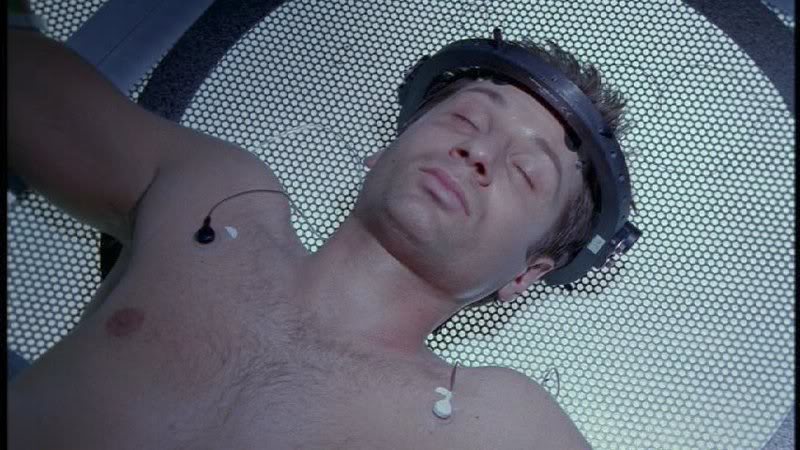
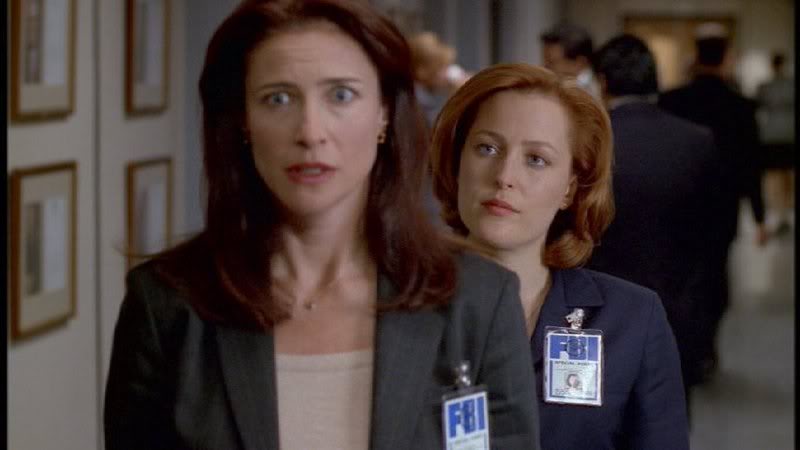
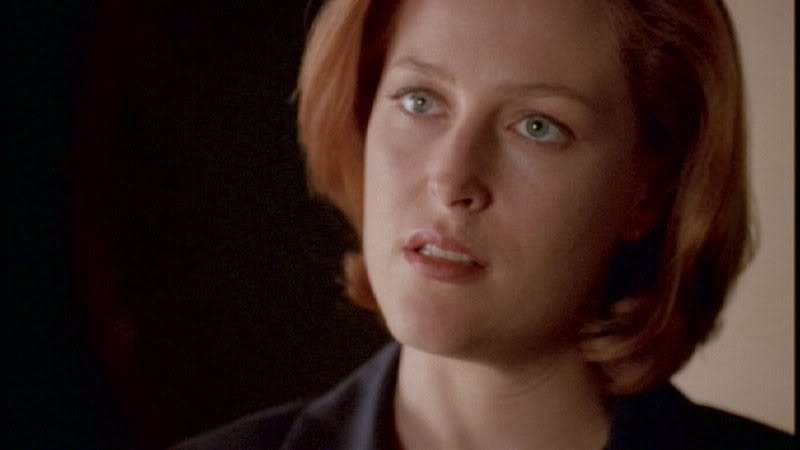
-- Was Cigarette-Smoking Man *really* Mulder's father? Although his declaration as such was part of Mulder's dream, CSM had apparently confided this fact to Fowley (though I hardly think you can take CSM's word as the gospel truth).
-- There was a scene between Mulder and Samantha (part of Mulder's dream) in the original script, with Samantha trying to persuade Mulder to give up his old life, but it was cut from the final version.
-- The part of Mulder's dream where his life passes by so quickly where he is married, has children, sees his wife dead, and ages about 40 years in a matter of seconds probably most mirrors the temptation scene in TLTOC. Jesus' temptation dream was also supposed to have lasted only a few seconds; the entire dream experienced in the time it took Jesus to utter the sentence, "My God, my God, why hast thou forsaken me?" Love the "heartbeat" underscoring the scene.
-- A scene that did not make the final cut of the episode had Mulder watching himself as he aged.
-- Beautiful line: "There are more worlds than the one you can hold in your hand."
-- William Davis was quite happy with the episode. "For me, the episode was terrific to play because they ended up making Cigarette-Smoking Man a little tougher. We have seen so much softness in him; it was great to play that tough side." [Says me: Softness? What exactly has the Cigarette-Smoking Man been smoking?]
-- But the down side for Davis turned out to be the sequence in which he and Duchovny were strapped down on adjoining gurneys for the transplant procedure. "I remember being totally uncomfortable lying on those tables. There was this metal strap that was pressing right into my shoulder blade. The only upside of that was that the author was lying right beside me, feeling equally uncomfortable. I wonder if David would have written it that way if he had known what he would have to go through."
-- When Diana noticed that Mulder's eyes were open during the procedure, the original script indicated that the doctors were "draining a black, oily liquid" through a shunt in Mulder's neck.
-- I liked the fact that Old!Mulder was most upset when he was told that Scully had died.
-- The sequence in which Cigarette-Smoking Man looked out a window and saw Armageddon was "one of our very best visual shots," said supervising producer Paul Rabwin. "We wanted to create a scene of Armageddon, with fire and spaceships dropping bombs," explained Rabwin. "Cigarette-Smoking Man is sitting in his room and he comes over and opens up the window and looks out. We shot that part on a stage with a lot of interactive light representing the explosions and bombs that CSM was seeing out the window. He lit a cigarette and the camera pulled back and that would ultimately reveal, of course, the end of the world."
-- "But this was shot before the world officially ended," Rabwin joked. "So when the camera pulled back from CSM, behind him was Soundstage 5 at Twentieth Century Fox Studios, along with a lot of little X's indicating tracking marks for Bill Millar, the visual effects supervisor, to follow. We then went out and shot some explosions to use as elements. We had some big ones, some giant fireballs, some spectacular ones, fire burning up from the ground, fire coming toward you, and burning up in the background. We took little pieces of flame and ashes and dropped them from above. These were used as reflections in the window and for views outside the window. Then the art department worked with Bill Millar to create these beautiful mat painting background scenes. We shot some blue screen over Cigarette-Smoking Man's shoulder, and when we finally put everything together you find that the stage disappeared and was replaced by the end of the world. That's real movie magic."
-- In another TLTOC parallel, Old!Mulder was ready to let go while the apocalypse raged outside; and Jesus was ready to let go as the unsaved world was rendered bare and desolate and Jerusalem was burning.
-- Nicholas Lea was not available when this episode was shot; but using a body double, creative camera angles, and a snippet of old footage, Krycek managed to make it into the episode anyway.
-- I'm back to chuckling as Scully wakes up after a night on the floor with not a hair out of place nor a wrinkle in sight. She's even still got her keys in her hand.
-- With the show's penchant for using birthday references in the scripts (1013, 1121, 925), it was a nice touch that the keycard slipped under Scully's door included the number MSF 1225 - Jesus' birthday.
-- The scene where Scully appears to Old!Mulder is perhaps the most important reference to TLTOC. In that story, as Jesus is near death, his old disciples appear to him one last time. Judas, who Jesus had been convinced was dead, finally forces Jesus to see that in accepting his crucifixion as a dream, he has abandoned the salvation struggle. "Traitor! Deserter! Coward!" Judas shouts at Jesus (some of that dialogue sound familiar?). "Your place was on the cross. That's where the God of Israel put you to fight." Jesus realizes that all his illusions were sent by the devil, and knows what he must do to accomplish the mission which the Lord had entrusted in him. In the XF version, Scully (a Mulder disciple if ever there was one) made Mulder see the "devil" for who he was and realize that he also had a mission, a destiny, a fate to complete.
-- The final parallel between TLTOC and the XF is the scene "on the cross." In TLTOC, Jesus resists the last temptation. He awakens on the cross, and accepts his fate to save mankind with complete willingness, saying, "It is accomplished." In the XF, Mulder also awakens on the "cross," accepting his fate to continue on, to get up and fight the fight to save mankind. In both cases, Temptation fought until the very last moment to lead the Savior astray, and in both cases, Temptation was defeated. And whether you like the TLTOC parallel or not, it is true that in the cases of both men, every obstacle in their individual journeys became a milestone, an occasion for further triumph.
-- Our two heroes share so much, even a tear. While Jesus had to die to save the world, Mulder had to live to accomplish the same mission. His weak "You help me," confirmed that he wasn't going to do it alone. I *firmly* believe that this scene marked the exact moment when Mulder and Scully were joined together permanently and unequivocally, all begun by the sharing of a single tear. As Jesus died on the cross and the destiny was accomplished, the last line of TLTOC novel is "And it was as though he had said: Everything has begun." When Mulder said "You help me," I felt he was saying the exact same thing.
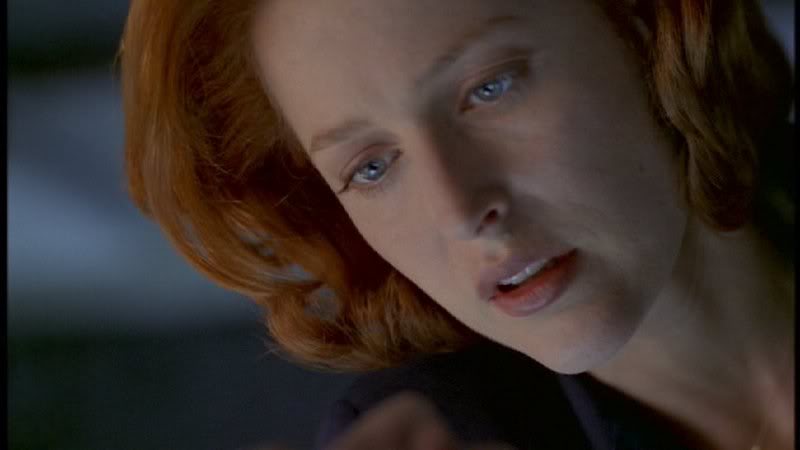
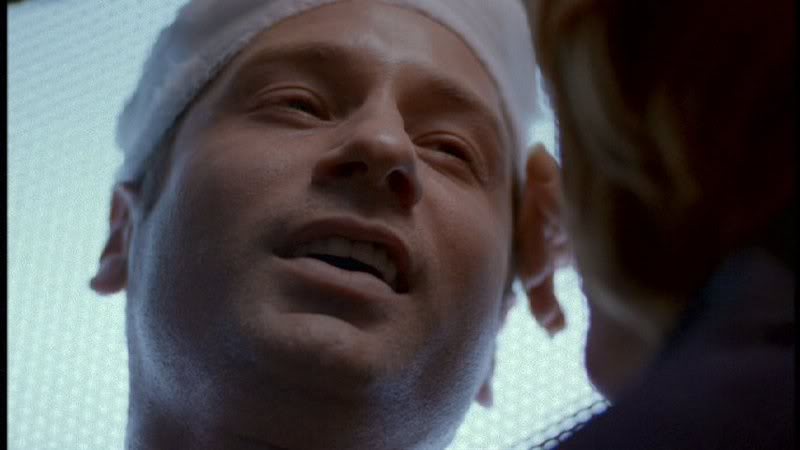
-- One week later? Mulder lost his mind-reading ability but not his ability to heal really fast. And Scully dug out her Fight the Future fantastically high heels and got a haircut. (More on that in a moment.)
-- Mulder delivered the news that Albert Hosteen was dead; and even though Scully wanted to return to her scientific ways, now she can't. Finally, she cannot reconcile her science with what she saw with her own eyes.
-- Scully delivered the news that Diana was dead; and though Mulder was stunned, it shouldn't have come as a surprise to viewers. It was a typical X-Files M.O. -- as soon as you develop a conscience or a heart, you're a goner.
-- But exactly why was Diana killed (other than to make shippers extremely happy)? How did anyone know that she provided the clues to Mulder's escape? In the original script, there was a scene of CSM waking from surgery. In the scene, he was told that they were hopeful the procedure worked, that Mulder had disappeared from the operating room, and that Diana's ID was used to breech security. That would seem to have sealed her fate, but excising that scene didn't share the answers with the viewers.
-- Anderson and Duchovny absolutely nail the last scene, both making the most of the rare chance to actually talk about how their characters feel about each other. And IMBO, the forehead kiss was just right at that point in their relationship, especially given what they had both just been through (although I always thought Mulder was headed for the lips). I think that Scully tracing her thumbs across his lips before turning on her 4-inch heels to go was more sensual/erotic than if they had ripped off all their clothes and gone at it right there on the floor. The two actors said more with their eyes and body language in that moment of silence than many TV couples say with pages and pages of dialogue. It was exactly right for them, the next step in the natural progression of their relationship. It was a commitment to each other and a promise for the future.
-- I also firmly believe that it was that unspoken commitment that finally allowed Mulder to see what the Boy on the Beach wanted him to see. He accepted his fate which may not have been a "normal" life but was a life that would include Scully. So Mulder was back to the beach, where he and the Boy worked together toward completing their project (a sand sculpture that mirrored Scully's discovery in Africa). The child had become father to the man. CSM started this story with Shakespeare's 29th Sonnet, and the end of that Sonnet would have complemented the end scene perfectly: "Yet in these thoughts myself almost despising, Haply I think on thee, and then my state, Like to the lark at break of day arising, From sullen earth, sings hymns at heaven's gate; For thy sweet love remember'd such wealth brings, That then I scorn to change my state with kings."
-- Just about *everybody* knows that there was one big difference between the original script and the version that made it to air -- the changing of the final scene. A new ending to the episode was filmed long after production on "Amor Fati" wrapped. This explained Scully's change in hairstyle (which she didn't change until about the 7th or 8th episode of the season), and Mulder's ability to know that the Yankees won the World Series (which happened just before the episode aired). The original ending (which is paraphrased below) took place in the XF office and packed none of the emotional punch of the revised version. It is popularly assumed that the new shippier ending was penned by Duchovny, though this has never been confirmed to my knowledge. Whoever's idea it was, it was the right one.
~ ~ ~ ~ ~
Scully comes into the office and finds Mulder there. There is Mulder dialogue about not wanting to lay around the house and Scully dialogue about resting up and recuperating. Mulder says he's interested in hearing about what Scully went through.
SCULLY: A wise man once told me there are more worlds than the one you can hold in your hands.
She then tells him about Albert and says there is no way he could have visited her. He asks what she thinks about that and she says she knows it's far beyond her mind's ability to fathom and hands him a wrapped book. She says she had it dusted for prints and it was sent by someone they both may have misunderstood ..."who may have given their life for yours."
SCULLY: Diana Fowley was found murdered in her car this morning. AD Skinner has the details for you if you want them. He's back at work.
Scully stands looking at Mulder for a moment, as he sits down. He's stunned, to say the least. He lays his head down on the desk so that Scully cannot see his face, his eyes. She touches his hair, then turns and leaves. Mulder remains like this, as ...
Mulder and the Dream Boy are at work on something, busy together. Happy, diligent. As we SLOWLY CRANE UP we see what it is: a large and spectacular sand sculpture of a space ship. [The shot should remind us of the last shot of Season 6.] And we keep pulling back and back until we FADE TO BLACK.
~ ~ ~ ~ ~
-- "Amor Fati" worked as an X-File and Frank Spotnitz marveled at the fact that the underlying theme, aliens as God or as the creation of God, did not result in any flack from the religious community. "We knew going into 'Amor Fati' that we would piss off some faction and we probably did, but we didn't hear anything from anybody. Often in the past we had done stuff where I was sure we would get angry letters. But we rarely did. And the reason is because of the way we handled things. In 'Amor Fati,' we treated the religious side with respect."
-- Once & Future Retreads: As noted above, many recurring characters reappeared in "Amor Fati." Additionally, Arlene Pileggi (Mitch Pileggi's wife and Gillian Anderson's photo double) played Skinner's secretary, as she had done in "Bad Blood," Triangle," "S.R. 819," "Monday," "This is Not Happening," "Dead Alive," and "Sunshine Days." She also appeared as the Woman Who Looked Like Scully in "Fight Club."
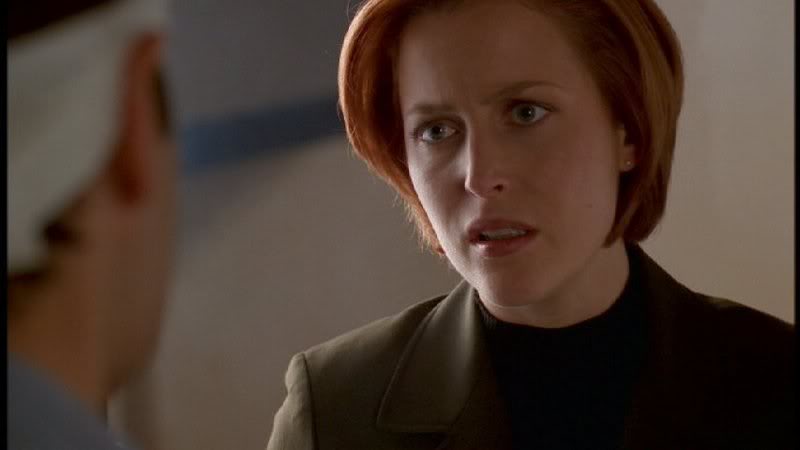
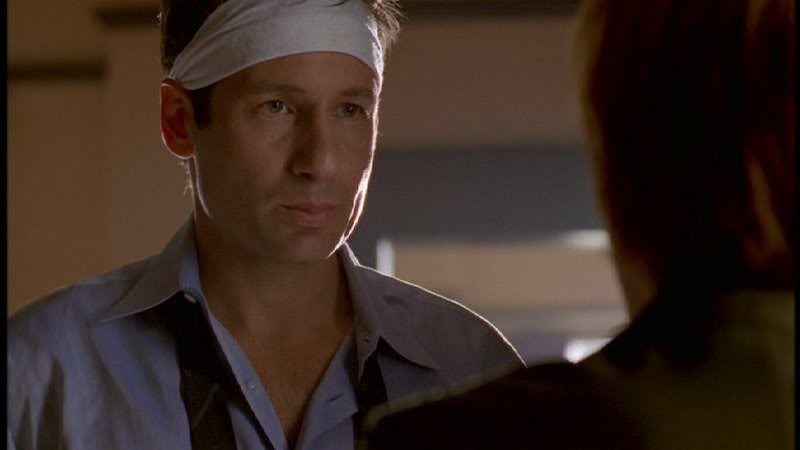
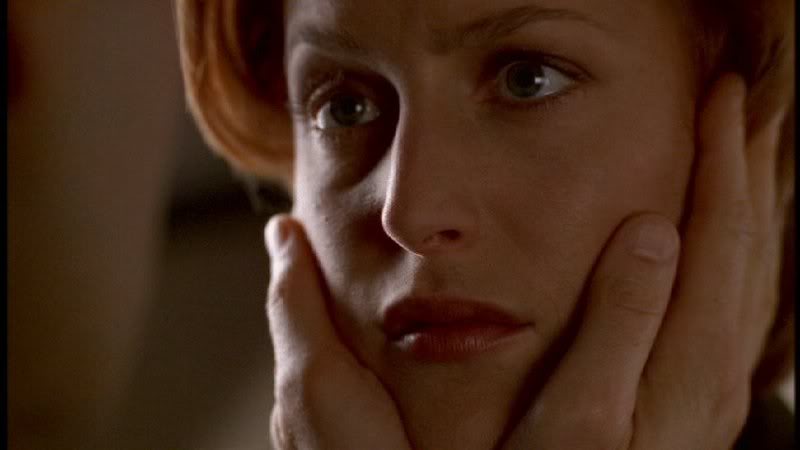
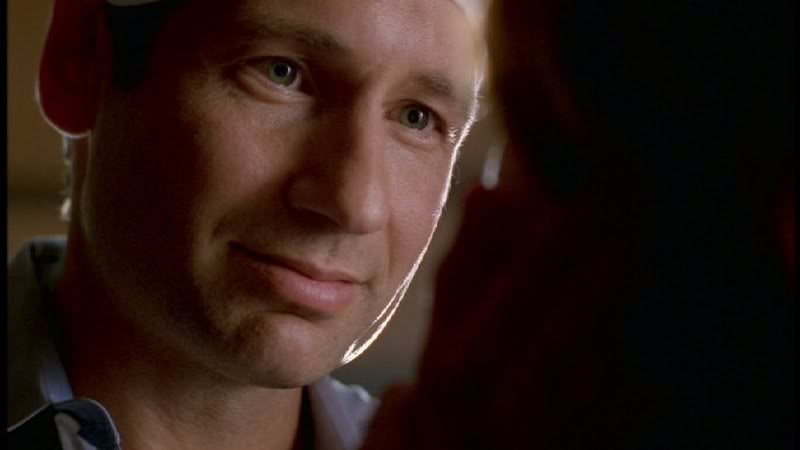
(Thanks to chrisnu and about dd for today's pics.)
Please share your first impressions, favorite (or cringe-worthy) moments, classic lines, favorite fanfic, nagging questions, repeated viewing observations, etc., as today we celebrate "The Sixth Extinction II: Amor Fati."
Polly